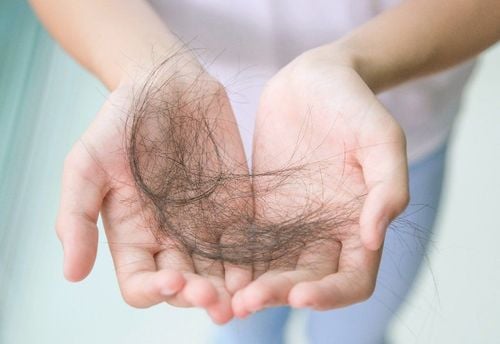This is an automatically translated article.
95% of male hair loss cases are genetic. This genetic trait often causes boys to have taller hairlines and thinner layers of hair. If you are concerned about going bald, talk to your dermatologist to find the right treatments.
1. What causes hair loss in men?
The majority of men who experience baldness can be caused by a genetic condition. These cases are known as androgenetic alopecia, a common name for male pattern baldness.
According to the American Hair Loss Association, 95% of hair loss in men is due to male hormone alopecia. Genetic traits tend to cause guys to have a high hairline with a thinner layer of hair. Genetic sensitivity to a metabolic product of testosterone, called dihydrotestosterone (DHT).
It is true that DHT-sensitive hair follicles tend to shrink over time. As the affected hair follicles shrink in size, their lifespan is shortened. Eventually, the affected follicles stop producing hair.
With male pattern baldness, hair loss often follows a predictable pattern. The two most common types of hair loss include:
Hair begins to thin at the top of the head and around the temples. This style can leave hair in a "horseshoe" shape around the sides and back of the head. Hair begins to fall out from the front, pushing the hairline further towards the crown of the head. The extent and progression of male pattern baldness was assessed by the Norwood classification system. This classification includes 7 stages that measure the severity and pattern of hair loss and baldness.
2. At what age does male hair loss usually start?
If you notice that your hair is thinner than before, you can feel comfortable because you are not alone. In fact, baldness affects the majority of men throughout their lives.
According to the American Hair Loss Association:
About 25% of men with genetic baldness begin to lose their hair before the age of 21. By the age of 35, about 66% of men will experience some degree of hair loss. By the age of 50, about 85% of men will experience a period of severe hair loss that causes significant thinning of the hair.

Rụng tóc nhiều ở nam giới thường gặp ở những độ tuổi nhất định
3. Causes of hair loss in men
Although hormonal baldness is the leading cause of baldness, it is not the only mechanism that can cause hair loss. In men with male pattern baldness, the symptoms appear to be nothing more than thinning of the hair.
The following causes can cause hair loss to varying degrees. Some types of hair loss can be permanent, while others are reversible:
Alopecia areata : The mechanism is thought to be related to the body's immune system mistakenly attacking healthy hair follicles, leading to hair loss. Hair usually falls out in small patches on the head, but it can affect other parts of the body as well. For example, you may find a bald spot on your beard, eyelashes, or eyebrows. The hair may or may not grow back. Telogen effluvium: Excessive hair loss can sometimes occur about 2 to 3 months after some stress on the body. Hair loss can be caused by an accident, surgery, illness, a lot of weight loss, or some kind of psychological stress. Hair usually grows back within about 2 to 6 months. Nutritional deficiencies: Iron and other nutrients are essential for overall health and healthy hair growth. Protein, vitamin D as well as adequate intake of other vitamins from the diet are important to owning a healthy hair. A deficiency in one or more of these nutrients can cause you to lose more hair than usual.
4. Drugs can cause hair loss in men
Drugs are also one of the causes of hair loss in men. Hair loss caused by certain medications is usually temporary, meaning that once you stop taking the medication, hair growth is likely to be restored. Some medications linked to hair loss include:
Chemotherapy drugs Acne medications such as isotretinoin (Accutane) Antifungal drugs, especially voriconazole Anticoagulants such as heparin and warfarin Immunosuppressive drugs lowering blood pressure such as beta-blockers and ACE inhibitors Cholesterol-lowering drugs such as atorvastatin and simvastatin Antidepressants such as fluoxetine and sertraline
5. What are the effective treatments for male pattern baldness?
Here are some common and effective treatments for male pattern baldness:
Medications: Both prescription and over-the-counter medications are approved to treat male pattern baldness . Some medications that have been shown to treat or prevent male hair loss are Finasteride and minoxidil. Laser treatment: Low-intensity laser therapy can be used to help increase circulation in the scalp and stimulate hair follicles to grow. Although this is a fairly new treatment, laser therapy has been shown to be safe and applicable. Hair transplant surgery: The two most common hair transplant procedures are follicular unit (FUT) implantation and follicular unit extraction (FUE). FUT involves removing part of the skin at the back of the head where hair is still growing. This skin is then divided into hundreds of small pieces called grafts. These grafts will be inserted into parts of the scalp where hair does not grow. With FUE, the surgeon removes individual healthy hair follicles from the scalp, then makes small holes in the hairless skin and places the healthy hair follicles in these holes.

Bác sĩ có thể dùng thuốc điều trị rụng tóc nhiều ở nam
6. Can baldness be prevented?
Baldness is usually a genetic condition. It is very difficult to reverse any naturally occurring hair loss. However, you can prevent hair loss from getting worse.
Finasteride and Rogaine are two proven treatments that can prevent more hair loss for male hormone alopecia. When you stop using these medications, hair loss may continue.
Talk to your doctor to see if these medications might be right for you.
To keep your hair healthy and prevent hair loss from other causes, try these remedies:
Regular scalp massage can help stimulate hair growth. Stop smoking. Previous research has shown that smoking is linked to hair loss. Manage stress through exercise or deep breathing. Eat a balanced diet rich in protein, iron, and vitamins. Changing medications: If you think medication is the cause of your hair loss, talk to your doctor about other alternatives that may be more effective. In summary, in 95% of cases, baldness is hereditary. It can affect men of any age and even begins to appear before the age of 21. Although male pattern baldness cannot be prevented, there are ways to slow hair loss such as medication, hair transplant surgery, etc. If you are concerned about baldness, talk to your doctor. dermatologist to find the right treatments.
Please dial HOTLINE for more information or register for an appointment HERE. Download MyVinmec app to make appointments faster and to manage your bookings easily.
Reference source: healthline.com













